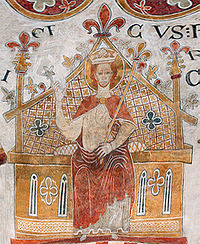Ejek Vedotin
Crown Bishop Erik Slaten | |
|---|---|
 | |
| Native name | Ejek Vedotīn |
| Birth name | Erik Slaten |
| Born | 15th June 1070 Vedotī, Flatstone |
| Died | 23rd August 1144 Vedotī, Flatstone |
| Buried | Unknown |
| Allegiance | |
| Rank | Dugāposun of Northern Ivili, Crown Bishop |
| Battles/wars |
|
| Spouse(s) | None |
| Children | None |
| Other work | Geology |
Historical records in the possession of Flatstones royal family date as far back as 1089, when the archipelagos economy was defined by manorialism and Stonish politics were dominated by powerful clans and ruthless warlords. Most notably of which was the prophet who went by the name Erik Slaten. Erik Slaten achieved a substantial amount of power through the spread of his religion, most popularly known as Geology (Or "Şotundo") today. Supposedly having been raised in the archipelago's capital of Vedotī, at the time owned by the notoriously influential ![]() Northern Ivili Clan, Erik Slaten founded his religion on the basis that the planet Anteria is one large rock that should be worshipped eternally. The religion gained the attention of the archipelago's population, as many were looking for a spiritual escape from the civil war that had plagued the north for decades. Erik used this religion to boost his legitimacy and overthrow the ruling "Dugāposun" (Meaning "Head") of the
Northern Ivili Clan, Erik Slaten founded his religion on the basis that the planet Anteria is one large rock that should be worshipped eternally. The religion gained the attention of the archipelago's population, as many were looking for a spiritual escape from the civil war that had plagued the north for decades. Erik used this religion to boost his legitimacy and overthrow the ruling "Dugāposun" (Meaning "Head") of the ![]() Northern Ivili Clan through a military coup.
Northern Ivili Clan through a military coup.
Early Life
Little is known about the youth of Erik Slaten, however personal accounts of those whom had been close to the prophet tell a story, a story of ruthless determination and social isolation. Erik Slaten was believed to be a cynic, seeing himself as above all others and intellectually superior. However, he never made his peers aware of his god complex; he kept it to himself. His parents were likely the only ones who were aware of Erik's mental instability. Erik spent the remainder of his childhood in isolation, devoting a large amount of his time to his studies and what we can only assume was his future. It is likely that a childhood full of judgement and unyielding pressure from his friends and family lead to the development of Erik Slaten's self-important personality and mindset. Erik believed that friends were temporary and expendable, and he put as little of his faith into others as he could, favoring his own judgement over theirs.
Parents
There are no historical records of Erik Slaten's parents; as far as history is concerned, Erik Slaten's parents do not exist. However, it is safe to assume that Erik Slaten had at least one parental figure, as quotes from Erik Slaten himself indicate that he was at some point in time living under the supervision of an unnamed man, presumably his father. If this is the case, then it is plausible that Erik's mother passed away at birth, or during Erik's youth. Regardless, whomever was responsible for Erik was very obviously abusive and unnecessarily harsh on the young prophet, as Erik's personal recollections state that his determined studies were often interrupted by his negligent superiors, and that this lead to his disregard for any authority that was above him after he had fully matured. As for what happened to his surviving parents is unknown. However, it is reasonable to assume that Erik fled from his home around the age of sixteen in order to pursue his ambitions.
Ambition
Erik Slaten was an extremely ambitious individual, much more than what was considered usual for the time. Erik Slaten's personal accounts recount that Erik dreamed of the future, and that he aspired to be the one to lead his people into it. He dreamed of uniting the archipelago under him and exploring beyond its shores. It should be noted that all of these ambitions would later be picked up by the future rulers of the archipelago, most notably Eirik Von Stone. Geology played a significant role in the accomplishment of Erik Slaten's dream of national domination, for it encouraged unity and it brought the spark of hope that hundreds of thousands has so desperately longed for. The people of Flatstone prior to it's unification all thought similarly to Erik, however Erik would be the first to introduce the idea of geographical unity to the archipelago. This would inevitably be inherited by his successors and incorporated into the ideals of Geology.